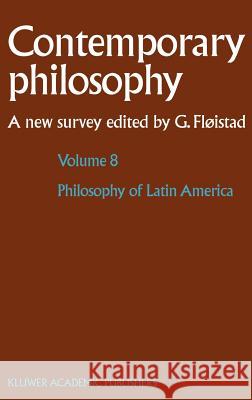Philosophy of Latin America » książka
Philosophy of Latin America
ISBN-13: 9781402014765 / Angielski / Twarda / 2003 / 316 str.
Does Latin America have a philosophy of its own? From the point of view of the often assumed universal character of philosophy, the question appears to be senseless. Not so to many - perhaps most - Latin American philosophers. The question is raised, in several chronicles, and clearly stems from the socio-economic and cultural history of the continent. For hundreds of years, European powers, Portugal and Spain in particular, have dominated the socio-economic life, political system and the cultural expressions of countries in Latin America. Europeans have imposed upon them their languages and religious beliefs, with Christian philosophy dominating the scene from the middle of the 16th century onwards. No wonder then, that in the wake of colonialism, questions of the development of an independent economy, a just political system, the relief from poverty and a specific Latin American cultural identity are being raised. These questions are linked to philosophy because philosophical reflection is part and parcel of most cultures.
In most contributions collected in this volume, the influence from European and American philosophy can be felt. Remarkably, ten out of thirteen philosophers feel that the working out of a genuine Latin American local, national and continental cultural identity is a challenge to philosophy.
This volume contains articles on topics within a variety of disciplines: political philosophy, ethics, history of philosophy, formal logic, philosophy of science and technology, as well as philosophical interpretation of literature. It is relevant to a large audience of philosophers and researchers in these disciplines.











